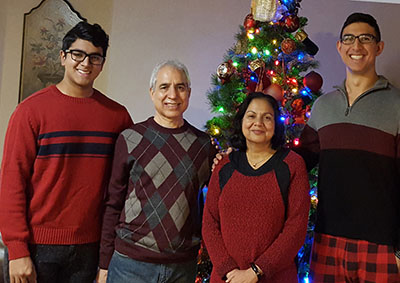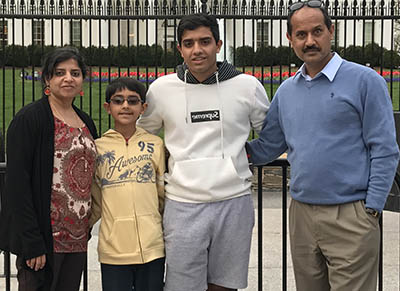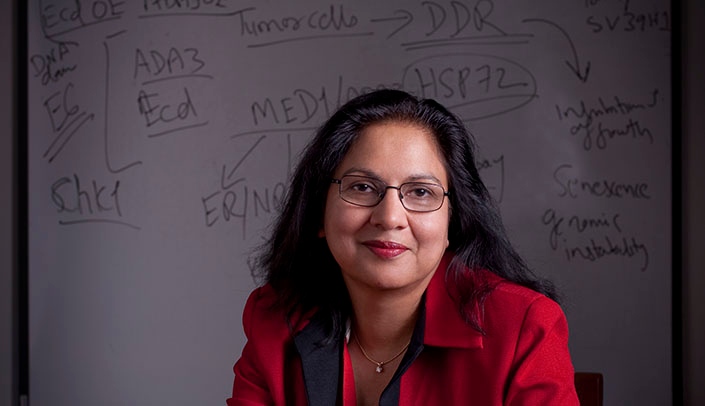In April, UNMC faculty offered their perspectives on work-life balance to students at a UNMC Graduate Studies professional development “Lunch and Learn.”
The word “balance,” in work-life balance, can be deceiving.
It doesn’t mean perfectly balanced, like a scale. More like a see-saw, said Andy Dudley, Ph.D., associate professor of genetics, cell biology and anatomy. Sometimes one side is up, and the other down. At other times, the first side is down, and the other is up. If you are doing it right, it balances out.
 |
Vimla Band, second from right, as wife and mother, with (from left), son Neil, husband Hamid Band, M.D., Ph.D., and son Sheehan. |
“I had my first child when I was a postdoc,” said Vimla Band, Ph.D., chair of the UNMC Department of Genetics, Cell Biology & Anatomy. “I had my second child when I was an associate professor.”
There was a difference.
Naturally, young, single go-getters, looking to make their mark (postdocs), will be expected to put in more hours at work, and often, will even enjoy doing so. These same folks may see these long hours with a new perspective a few years later, when spouses and children arrive.
It all balances out.
But wait, said Pamela Carmines, Ph.D., professor of cellular and integrative physiology. Singles still have home-life responsibilities — and no one else at home to help shoulder the load. Singles need to self-advocate for balance, too.
“It’s a challenge in every workplace, and in every part of your career,” Dr. Carmines said.
But we should remember, Dr. Band said, even scientists with less flexibility than their more-senior counterparts often have more flexibility than most.
“Being a scientist is a privilege,” she said, “because you can always do that experiment two hours later. If you are a doctor or a businessperson, and you have to be there at 7 a.m., you have to be there at 7 a.m.”
And, said Karen Gould, Ph.D., associate professor of genetics, cell biology and anatomy, if something is important to you, block out time for it.
“Watering my plants, I have to put it in my calendar,” she said.
But, Dr. Dudley said, remember that you have a limited amount of time and a limited amount of energy. You have a successful career, great kids — but your house may not look like Martha Stewart’s house. Pick where you want to spend that time and energy, and be happy with your decision, Dr. Dudley said.
Back to the see-saw theory, those choices are an ever-evolving dynamic.
 |
Amar Singh, Ph.D., far right, with his family, (from left) Punita Dhawan, Ph.D., and their sons Anuj and Aayush |
He and his wife, both scientists: “The most relaxed phase of our lives, we both were postdocs.”
Before kids threw everything for a loop, as kids always do.
But in a most(ly) wonderful way.
But, in order to be there for your families, and for your work, you need stress management, in addition to time management.
Dr. Dudley likes to walk his dog. “And during that time I can complain about anything,” he said.
Dr. Band advocates “pillow talk.”
“You talk to your pillow,” she said. “Leave it there. The next morning you start fresh and wake up fresh.”
Jennifer Black, Ph.D., program director of the Gastrointestinal Cancer Research Program, said if it is work that is giving her stress, she thinks about family. If it’s a family issue, she takes it off her mind with work.
“And I love to make theme cakes,” she said.
Bottom line, “Don’t stress yourself about relieving stress,” Dr. Singh said.
That’s good advice.

Great story, Kalani. Thanks to all the scientists for providing their wise perspectives.